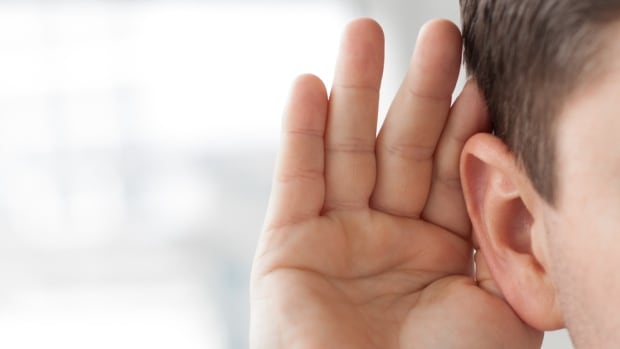The Current23:55Retraining the brain to silence tinnitus
Read Transcribed Audio
For nearly 40 years, Ken Jones has heard a very loud hissing in his ears.
“It sounds like [an] electrical power line,” he told The Current‘s Matt Galloway. “Mine is at about 92 dB on the decibel scale” — as loud as hairdryers and power tools.
The sound started after a “very minor” rear-end collision on Nov. 8, 1984, and was amplified by a second collision in 1999. It gets louder when Jones thinks about it, and it’s affected his sleep and motivation to work, he said.
“For the first couple of years, I had some depression as a result of it. I couldn’t find any help or couldn’t find any information.”
Jones is experiencing tinnitus — a ringing or whooshing sound in the ears — usually caused by hearing loss, hearing damage or head injuries. It has no external sources, so others can’t hear it. But for some of those living with it, it’s a loud, annoying sound that can make life difficult.
According to 2019 Statistics Canada data, an estimated 9.2 million Canadian adults — about 37 per cent of the population — had experienced tinnitus in 2018, including seven per cent that were bothered by it, affecting their sleep and mood.
It’s devastating and puts people into a hopeless situation. They just don’t know where to turn.– Ken Jones, president of the BC Tinnitus Association
“Tinnitus, unfortunately, has [no] easy solutions,” Sylvie Hébert, a professor of audiology at the University of Montreal, told The Current‘s Matt Galloway, noting while there is no cure, there are emerging approaches that may help alleviate the symptoms.
“But, yeah, people, patients often are faced with some kind of helplessness.”
It’s a familiar feeling for Jones, president of the BC Tinnitus Association, which organizes support groups in the Greater Vancouver area.
In his role, Jones says he gets calls from people ranging in age from 14 to their 90s who find their tinnitus disruptive or even debilitating with some reporting suicidal thoughts.
He says he’s heard countless times from people who’ve gone to their doctor hoping to treat their tinnitus, only to be told there’s nothing that can be done about it — something he heard as well when he first sought help.
While people with tinnitus usually accept the condition over time, Hébert says specialists “want people to feel better and to, eventually … eliminate tinnitus.”
Retraining the brain
Some scientists are trying to figure out treatments that would do just that. One such technique is bimodal neuromodulation, a treatment approach that targets the brain by stimulating two sensory systems. According to Hébert, it’s based on the pioneering findings of American audiologist Susan Shore that “some of the auditory pathways can integrate information from different senses” like skin and the tongue.
Shore demonstrated that “pairing two stimuli will decrease the increased spontaneous activity related to tinnitus,” Hébert said.
Bimodal neuromodulation is based on brain plasticity — the nervous system’s ability to change its activity in response to intrinsic or extrinsic stimuli — and uses sensory modalities like sound and touch to regulate and change the maladaptive connections or those that interfere with a person’s day-to-day life.
Through bimodal neuromodulation, Hébert said some scientists are trying to teach the brain that tinnitus should be toned down.
“[It’s] relearning that, through the pathways, that the tinnitus sound is not an important sound, and that the person should not listen to it,” she said.

One device trying to do that is Lenire, developed by Neuromod Devices. The device is comprised of headphones and a mouth attachment that patients wear everyday for an hour for at least six weeks.
The headphones play sounds across a range of frequencies and the mouth device delivers mild electrical pulses to the tongue.
In a statement to The Current, Neuromod Devices said by using bimodal neuromodulation, Lenire can help the brain significantly reduce its fixation on tinnitus sounds in favour of non-tinnitus, “friendlier” sounds.
“This, in turn, can vastly improve a tinnitus patient’s quality of life.”
But Hébert says more scientific research must be conducted first.
“From the studies that I’ve read that were published with the device, there’s no good placebo-controlled studies.”
Neuromod Devices said its most recent controlled clinical trial, which resulted in De Novo approval from the U.S. Food and Drug Administration — a classification system for novel devices — found Lenire’s bimodal neuromodulation to be “more effective at reducing the impact of tinnitus” in patients with moderate or worse tinnitus than sound-only stimulation.
The results are currently being peer-reviewed for publication later this year, the company said.
For the time being, the company says it is focused on its U.S. providers, but Canada is in its expansion plans “for the near future.”
No one-size-fits-all approach
Although Neuromod Devices says its clinical trial and real-world results are “encouraging,” it acknowledged its device is not appropriate for everyone.
“It is an essential aspect of treatment with Lenire that it is only available through suitably qualified, and rigorously trained health-care professionals who have significant experience treating tinnitus patients.”
Hébert says tinnitus is an intimate experience with no external source for the sound, so it’s difficult to find a single solution that would work for everyone.
“We only can approach what the person is listening, is hearing in her head or in his head,” she said.
“If we have two persons with the same frequency, the same [external] sound intensity, one will live very happily with the tinnitus and the other person will go crazy with his tinnitus for the same intensity — and that’s a challenge and a mystery for us.”







